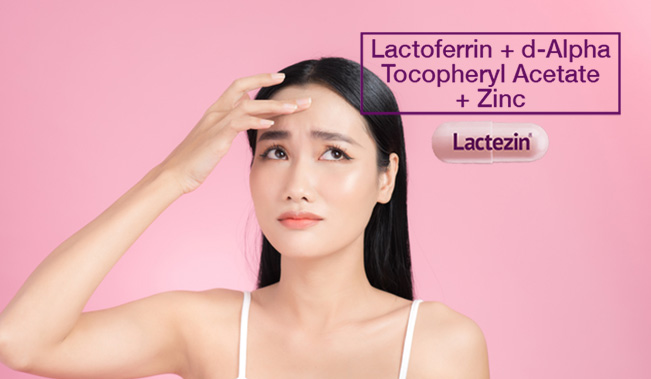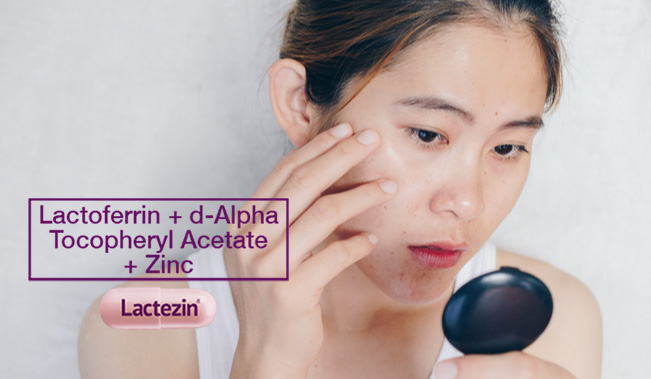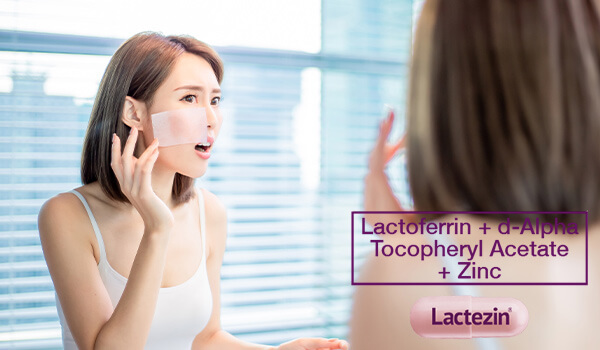Afternoon Shine & Acne: Preventing an Oily Face During the Day

Oily face check! Pause and take a second to check on your T-zone (or the area around the forehead and the length of the nose). If it’s shiny and on the greasy side, two things are true: One, there’s an overproduction of sebum on your skin, and two, acne such as pimples, blackheads and whiteheads are likely to appear. While oily skin and possible after-acne are common in most people, know that there are ways to prevent regular occurrences. Read on to learn about how to prevent an oily face during the day.
Oil is a Part of Healthy Skin
But first, it’s important to understand that oil on your skin is not all bad. In fact, it is a key component in healthy skin. Sebum is an oily, waxy substance produced by the skin’s sebaceous glands. Made up of fatty acids, sugars, waxes and other natural chemicals, sebum helps keep the skin stay hydrated, flexible, and protected against oxidative damage.
Healthy from within, rarely dull and young-looking on the outside – these are the perks of having oily skin. On the flip side, an overproduction of sebum can lead to having a shiny complexion during midday or afternoon, and worse, acne.
How to Control the Skin’s Sebum Production
Can you control how much the skin produces sebum? The answer is both yes and no. Experts have yet to fully explore the whats and hows of sebum production. What has been observed about the complex process is that there seem to be a few factors that affect the production of sebum. The most common are the following.
Hormones
Specific hormones have been studied for their effects on sebum production. Androgens for one, help regulate the process. The more active these hormones are, the more sebum the body’s sebaceous glands produce. This may be one of the reasons why oily skin and acne are very common during puberty (when there is an increase in androgen volume).
Cortisol, also known as the stress hormone, triggers the production of CRH which stimulates more oil from the sebaceous glands. That’s why when you’re stressed, your skin can sometimes be oilier than usual, and the occurrence of pimples is likely.
Genetics
Do you have oily skin or acne-prone skin? It’s highly likely that you’ve inherited this from your parents. Genetics dictate your skin type.
Age
The skin’s sebaceous glands function at varying degrees in various stages of life.
- Before birth: produces a fluid that coats and protects the body while in the womb
- After birth: produces high volumes of sebum and slows down after the first 3 to 6 months of life
- Puberty: sebum production picks up (increasing up to 500%) before declining for the rest of life
Climate
Another external factor is climate. Hot and humid conditions trigger more oil production from the sebaceous glands.
Skincare
Externally, the skin care products that you use can also affect sebum production. Harsh or strong-formulated items can strip too much oil, leaving the skin dry. This may cause the sebaceous glands to overcompensate by producing more oil.
You can’t control genetics, hormones or how the sebaceous glands function. You can, however, influence the skin’s sebum production by turning to healthy habits and using the right skincare products. And by stopping or preventing excessive oil production, you can prevent acne breakouts and blemishes.
How to Stop Oily Face During the Day
Regularly troubled with the shine of an oily face? Keeping your skin’s sebum production regulated is key. Check out these suggestions on how to prevent oiliness during the day.
Start with Your Skincare
Revisit your skincare routine and tweak to one that fits the needs of the oily skin type. Stick to these oily skin musts.
- Never cleanse more than twice a day
- Exfoliate no more than once a week
- Moisturize daily
- Don’t forget sunscreen in your day routine
Pick Your Skincare Products
Just as it’s important to know what goes into the food that you consume, knowing what’s in your skincare products helps get the right care that the skin needs. For oily skin, keep these reminders in mind.
- Cleansers with salicylic acid or glycolic acid are effective in cleansing and preventing clogged pores
- Switch to chemical exfoliators for gentle exfoliation without abrasion
- Avoid alcohol-based toners
- Trade your cream moisturizer and sunscreen for the lighter and oily skin-friendly gel alternatives
- Keep it light with your makeup
- Keep a fresh face all day with blotting sheets
Eat Right, Eat Healthy
For a more holistic approach to controlling oily skin, you can also eat food that’s best for your skin type. Anti-inflammatory oils in avocado, olive and fish can be helpful. Additionally, avoid consuming sugary and processed foods.
Consider Oral Medication
Anti-acne medication can help with keeping the skin healthy and in top condition. For an oral remedy that works, experts recommend looking into the components and what they do for the skin.
Excess Oil is Just 1 of the 5 Main Causes of Acne
While it’s usually tagged as the main culprit, excess oil on skin is just one of a handful of factors that increase the risk of acne breakouts. Bacteria, inflammation, free radicals and skin dryness are other elements to watch out for. The good news is that these acne triggers can be dealt with from within the body.
Lactoferrin + d-Alpha Tocopheryl Acetate + Zinc (Lactezin) is the Pimple Expert. It helps treat and prevent acne with 3 main ingredients:
- Lactoferrin to help combat bacteria and inflammation
- Vitamin E to help address free radicals and dryness
- Zinc to help with regulating the production of oil.
Along with proper diet and exercise, continued intake of 2x daily produces visible results in as early as 2 weeks. Lactoferrin + d-Alpha Tocopheryl Acetate + Zinc (Lactezin) is available in leading drugstores, supermarkets and online shops Shopee and Lazada.
If symptoms persist, consult your doctor.
SOURCES:
https://www.proactiv.com/blog/skin-types-and-acne/how-to-stop-oily-face-during-the-day
https://www.prevention.com/beauty/skin-care/a28209367/how-to-get-rid-of-oily-skin/
https://www.self.com/story/skin-always-oily-halfway-through-the-day
https://www.healthline.com/health/t-zone-face
https://www.allure.com/story/what-is-sebum
https://www.healthline.com/health/beauty-skin-care/sebum
https://www.healthline.com/health/stress-on-face
https://lactezin.com/your-guide-to-oily-skin
https://www.medicalnewstoday.com/articles/322639
https://www.healthline.com/health/beauty-skin-care/the-best-diet-for-your-skin-type


